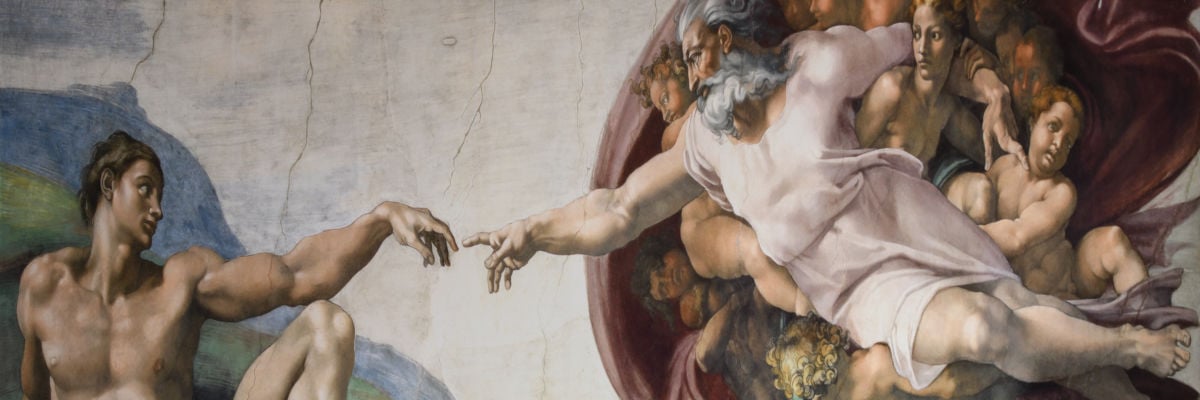
One thing that saints like Athanasius, Augustine, Anselm, and Aquinas all have in common is that they asserted that creatures can become God. This idea is also reflected in the Catechism of the Catholic Church: “The Son of God became man so that we might become God” (CCC 460). Both Saints Irenaeus in the West and Maximus in the East made similar assertions—in fact, they are who the Catechism cites.
How is this teaching not heretical, or completely insane?
The idea that man can become God has been called “Theosis,” “Deification,” or “Divinization,” and it actually has a solid pedigree among orthodox theologians, apologists, fathers, doctors, and saints of the Church. But where did they get this idea? After all, Scripture clearly teaches that there is only one God. This is evident from writings in both testaments including historical, prophetic, poetic books as well as gospels and epistles (e.g., Dt. 6:4, 2 Kgs. 19:19; Isa. 45:5; Ps. 86:10; Jn. 5:44; 1 Cor. 8:4; etc.). Further, it is clear from Scripture that men are not God and vice versa (e.g., Num. 23:19; 1 Sam. 15:29; Hos. 11:9, etc.).
However, Scripture also teaches that man can become God-like.
- “I say, ‘You are gods, sons of the Most High, all of you’” (Ps. 82:6 cf. Jn. 10:34)
- “The glory which thou hast given me I have given to them, that they may be one even as we are one, I in them and thou in me, that they may become perfectly one” (Jn. 17:22-23)
- “Know the love of Christ which surpasses knowledge, that you may be filled with all the fullness of God” (Eph. 3:19)
- “You may escape from the corruption that is in the world because of passion, and become partakers of the divine nature“ (2 Pet. 1:4)
- “Beloved, we are God’s children now; it does not yet appear what we shall be, but we know that when he appears we shall be like him“ (1 Jn. 3:2)
These passages suggest what theologians have called the “Formula of Exchange” – a teaching directly tied to the role of Jesus’ Incarnation’s in our salvation. However, neither these nor any other verses mean that human nature can be changed into the divine nature of God. What they mean is that human nature can partake in the divine nature of God.
So, if quotes from Church fathers, doctors, saints, popes, etc. are found that seem to indicate otherwise, they are not being understood correctly. While it is easy to compile quotes from various writers that “clearly” state that man can become God, there is always a theological context that must be kept in mind.
The guiding principle concerning these sorts of statements is that when divinity is predicated of humanity, it is according to participation in grace, not to generation by nature. In other words, “divinity” in these cases does not refer to a change in what something is, but rather what it is like. For example, when we participate in the Eucharist, we “become the body of Christ” (see 1 Cor. 10:16-17) – but we do not become the divine savior of the world!
St. Augustine makes this all-important distinction clear when he says,
He has called men gods, that are deified of His Grace, not born of His Substance. For He does justify, who is just through His own self, and not of another; and He does deify who is God through Himself, not by the partaking of another. But He that justifies does Himself deify, in that by justifying He does make sons of God. “For He has given them power to become the sons of God.” John 1:12 If we have been made sons of God, we have also been made gods: but this is the effect of Grace adopting, not of nature generating. For the only Son of God, God, and one God with the Father, Our Lord and Savior Jesus Christ, was in the beginning the Word, and the Word with God, the Word God. The rest that are made gods, are made by His own Grace, are not born of His Substance, that they should be the same as He, but that by favor they should come to Him, and be fellow-heirs with Christ. (Exposition on Psalm 50, 2)”
St. Thomas Aquinas is helpful here as well, because he more regularly states the qualifications that are needed. Note that in the quotes below, the highlighted statements sound quite “clear” until clarifying terms such as “sharers in” or “participation in” are added into the equation. Throughout his writings, Aquinas is adamant that the ontological distance between God and man (or any creature) is so far (namely, infinite!) that the two cannot even be compared on the same scale. God is so utterly “other” than mankind that human knowledge cannot comprehend God’s essence, nor can our language adequately communicate God’s essence.
Aquinas’s language concerning deification, then, must be understood in accordance with this position. Thus, in his theology of deification, he says things such as this:
But the Son did not love the disciples in either of these ways. For he did not love them to the point of their being gods by nature, nor to the point that they would be united to God so as to form one person with him. But he did love them up to a similar point: he loved them to the extent that they would be gods by their participation in grace ‑ “I say, ‘You are gods’” (Ps 82:6); “He has granted to us precious and very great promises, that through these you may become partakers of the divine nature” (2 Pet 1:4) ‑ and he loved them to the extent that they would be united to God in affection: “He who is united to the Lord becomes one spirit with him” (1 Cor. 6:17); “For those whom he foreknew he also predestined to be conformed to the image of his Son” (Rom 8:29). Thus the Father communicated to the Son a greater good, with respect to each nature of the Son, than the Son did to his disciples; yet there is a similarity, as was said. (Commentary on the Gospel of John, 1999)
Saints Augustine and Aquinas are the heaviest of the theological heavyweights in the Church. Their theological qualifications concerning deification can be applied to similar statements of orthodox theologians, apologists, doctors, and saints of the Church even when they do not indicate it in every particular statement. (Note: even when this distinction is not stated plainly, it is most often implied by terms such as “of” or “with” that can be easily glossed over if one is not looking for them.)
But what does this notion of participation mean?
The distinction between participation in grace and generation by nature is critical if one is to understand what these orthodox theologians are saying – one that, if missed or misunderstood, can lead to the kind of metaphysical confusion one finds in Mormonism or the Word Faith movement.
Here an illustration might help. St. John of Damascus speaks of being our “inflamed and deified by the participation in the divine fire.” Fire makes for a good analogy for participation. Consider a frying pan being heated over a fire. When the pan is put into contact with fire, it participates in the fire’s heat (i.e., it becomes hot). Now, the heat of the fire is what the fire is by nature, but the heat of the pan is that which it has by participation. When fire heats the pan, heat can be said to be part of what the pan is – but both the fire and the pan remain unchanged according to their basic natures. The pan becomes hot but it never becomes fire – hot or not, it remains a pan. Because both the fire and the pan can be said to “be” heat, there is an analogical sense in which the pan can be said to “be” fire – but this must be understood as referring literally to the pan’s participation in the fire’s heat – not that the pan literally becomes fire by nature. In the same way that we can say (accurately, but only analogically), that the pan can “become” fire, we can say that man can “become” God.
Participation also implies difference. God does not simply have more power than man, God’s power is of a wholly different kind. The same goes for all of God’s attributes: presence, knowledge, love, goodness, etc. God’s presence is also entirely unlike that of us human persons, as we must be in a particular place, while God is everywhere. So to say than God is present at church is not the same thing as saying a man is present at church. Similarly, even if a man were to somehow know all things, he would not be omniscient in the way God is. God knows all things as their creator – their first cause. This gives God a kind of knowledge man will never have, even if man could in theory learn all facts.
In saving mankind, God’s grace does not destroy nature, but perfects it; yet, even a perfected human nature is still limited to being what it is. It will always remain finite – and the distance between finite and infinite is so great that it is not a difference so much as a complete distinction. The same will always be true of God and man. God is absolutely unique and the infinite chasm between the Creator and the creature can never be crossed. It is clear from the writings of those who make such statements that no orthodox theologian is confused on this point, and such statements need to be read with the above distinctions in mind.
“If anyone desire in this way to be Godlike, he commits no sin; provided that he desires such likeness in proper order, that is to say, that he may obtain it of God. But he would sin were he to desire to be like unto God even in the right way, as of his own, and not of God’s power.” (Thomas Aquinas, Summa Theologiæ I, Q.63, A.3)



